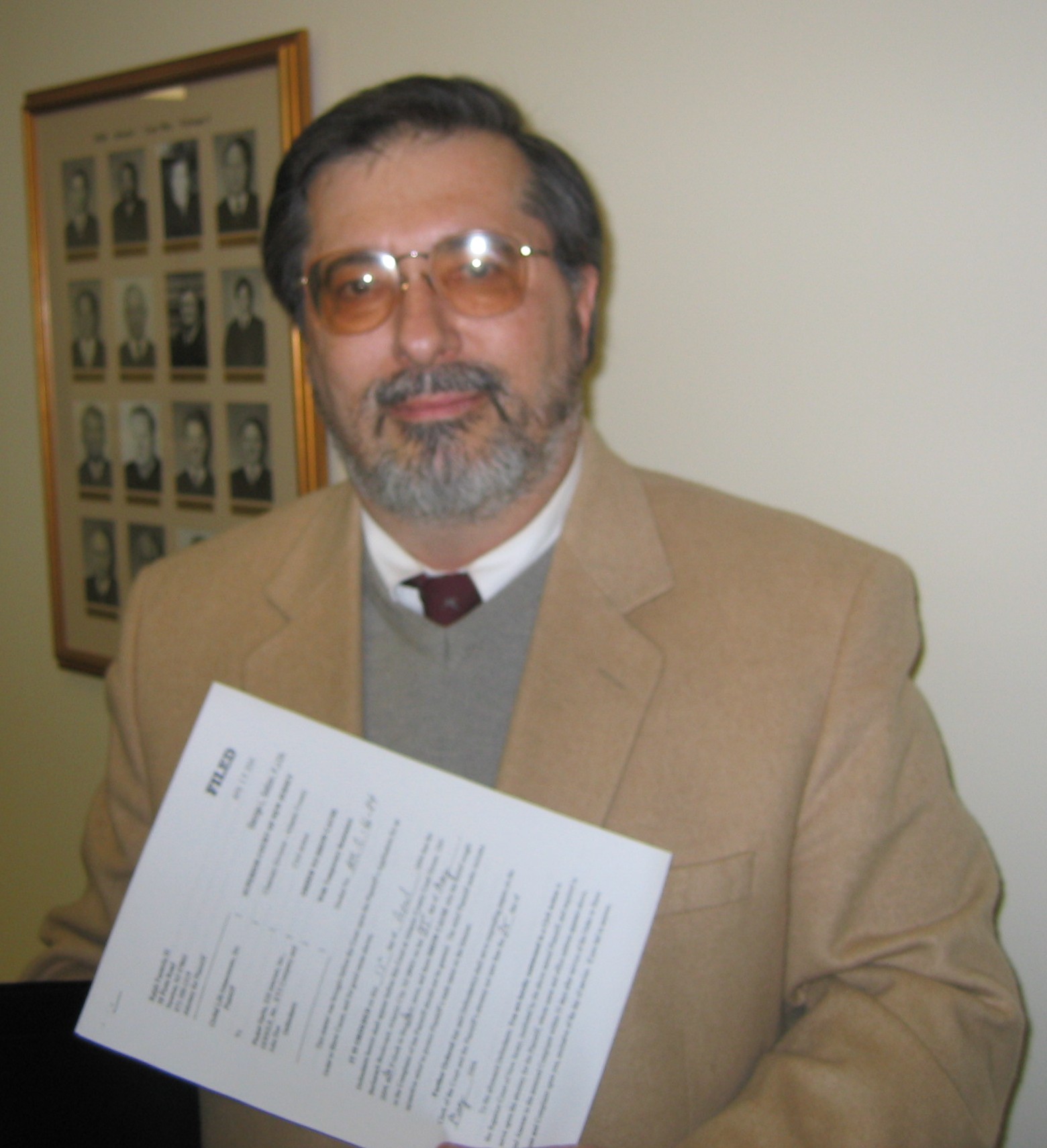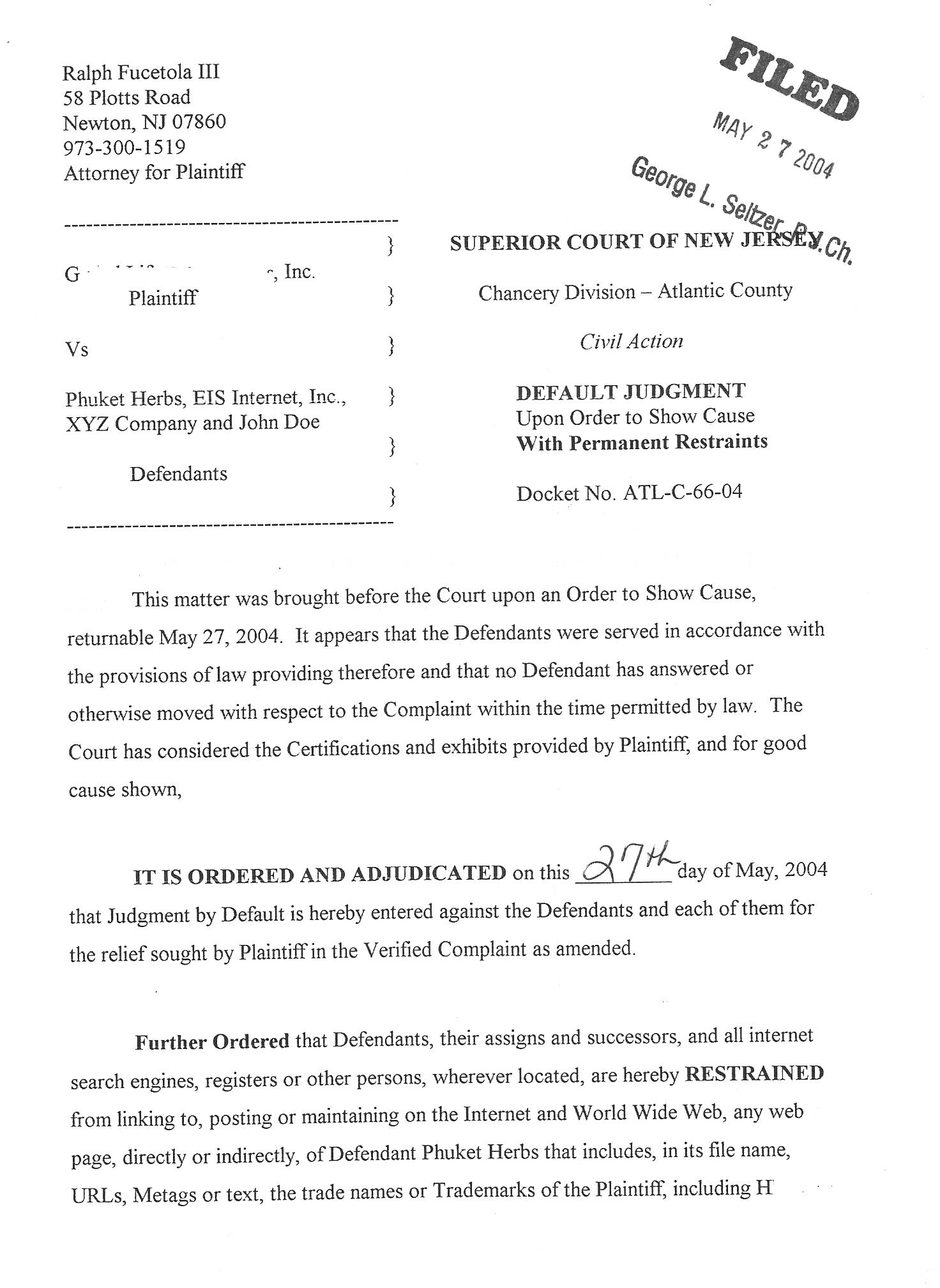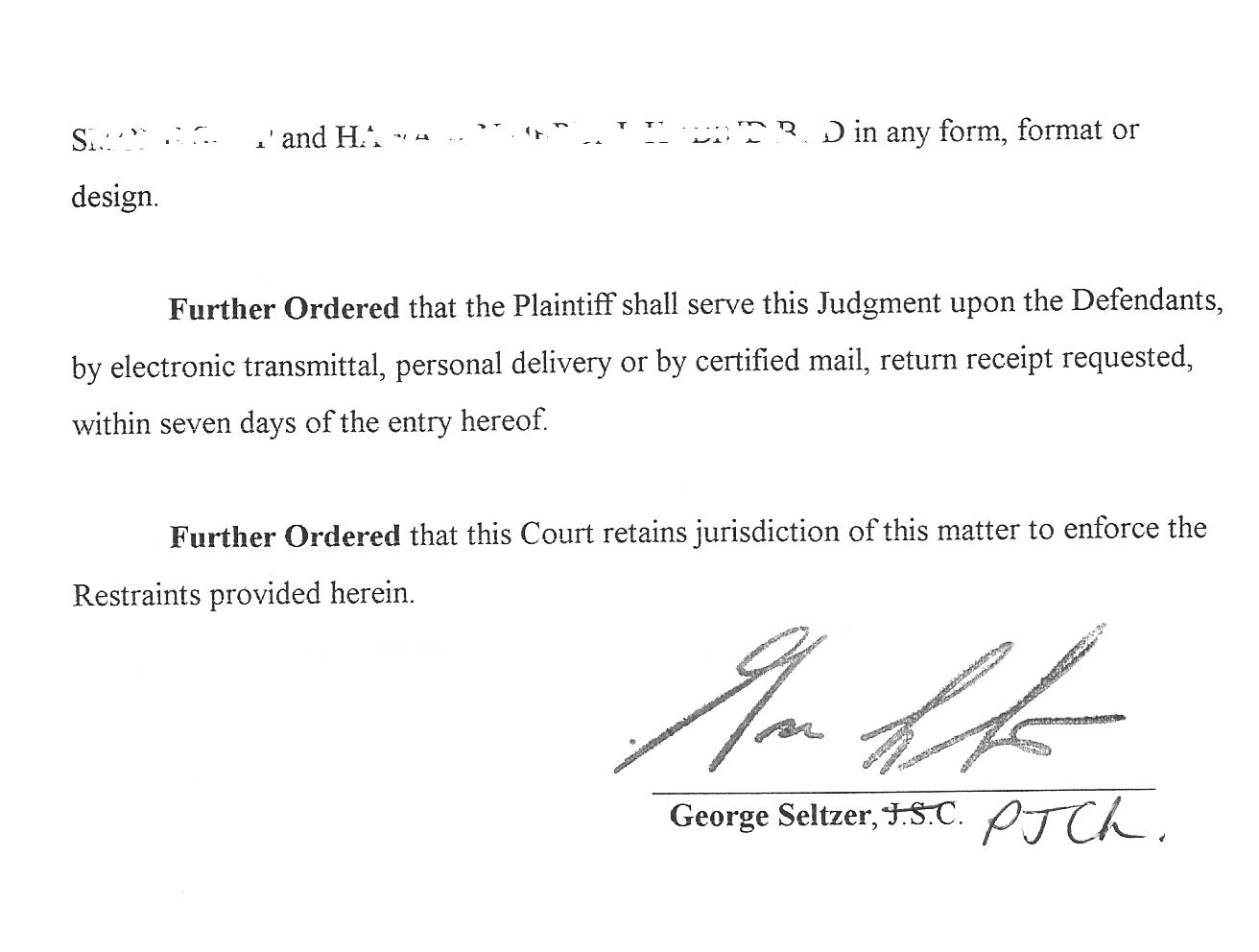Ralph Fucetola JD
www.internetinjunction.com
Precedent Setting Injunctions Issued in Internet Case
Index: Introduction,
Link to TRO,
Memorandum of Law,
Media Release
On April 12, 2004, Hon. George Seltzer, Presiding
Chancery Judge of Atlantic County, New Jersey, issued an Order to Show Cause and
Temporary Retraining Order in a case involving a New Jersey on-line vendor whose
trademarks and trade names were being cybersquatted by an off-shore web site.
On May 27, 2004 a Permanent Injunction was issued. A copy of the
Injunction is below. For further information about
Internet Injunctions, see:
http://www.internetinjunction.com. I can be reached at
ralph.fucetola@usa.net.
|

TRO Granted |
Link to the
May Injunction
Wording of the April TRO
"Further Ordered that Defendants, their
assigns and successors, and all internet search engines, registers or other
persons, wherever located, in concert with them, are hereby TEMPORARILY
RESTRAINED, until further Order of this Court, from linking to, posting
or maintaining on the Internet and World Wide Web, any web page, directly or
indirectly, ...that includes, in its file name, URLs, Metags or text, the
trade names or Trademarks of the Plaintiff, ... in any form, format or
design."
|
Top
MEMORANDUM OF LAW
[redacted]
SUPERIOR COURT OF NEW JERSEY
Chancery Division – Atlantic County
Docket No. ATL-C-66-04
Introduction
G xxx, Inc., a
New Jersey corporation markets under the Trademark H xxxä
and h xxxä. It is the
developer and owner of the Mark that Defendant Phuket Herbs of Thailand has
cybersquatted in violation of Plaintiff’s famous mark, per Shields v
Zuccarini (US Court of Appeals for the Third Circuit, No. 00-2236, June 15,
2001, discussed herein) through the use of online text, file name, URL
(Universal Resource Locator or domain name) and/or metatags. Plaintiff’s Marks
were filed for registration with the US Patent and Trademark Office, Serial
Numbers 78198706, 78319316 and 78388246. It has used same since at least June
1, 2000. Defendant Phuket’s use of Herbal Smoke Shop is confusingly similar to
the use by Plaintiff. Plaintiff's web site is at
www.herbal-smoke-shop.com.
The actual URL that violates the
Plaintiff’s rights is: http://www.herb-herbs-herbal-aromatherapy-essential-oil.com/herbal-2/h
xxx .htm
and it links to www.phuket-herb.com, the URL that serves as the main entry to
Defendan Phuket’s web store.
Defendant Phuket’s unauthorized
use will confuse the public and may constitute violations of civil and criminal
statutes, including the 1999 Anticybersquatting Consumer Protection Act (15 USC
1125), Fair Trade Laws, the Copyright Act, Consumer Protection Laws and the laws
protecting Trademarks. The other named Defendants are the registrar and/or
administrators of the URL and prominent search engines.
Statement of Facts
1. The Plaintiff, G xxx, Inc., is a New
Jersey corporation located in Galloway Township, Atlantic County, New Jersey
(Certificate of Incorporation, Complaint Exhibit A).
2. Plaintiff markets herbal products and accessories
through a web store on the Internet under the Trademark, H xxx and
URL www.h xxx.com.
3. Defendant Phuket, upon information and belief, is an
herbal supply company in Muen Phuket, Thailand. It markets under the URL
www.phuket-herb.com.
4. Plaintiff has filed for Trademark registration for its
trade name with the US Patent and Trademark Office, Serial Numbers 7 xxx,
7 xxx and 7 xxx.
5. Plaintiff’s Mark is a famous mark widely recognized on
the Internet. According to the Alexa rating system, it holds a rank of 42,620
while Defendant Phuket’s rank is 199,528 (Exhibit B).
6. Defendant Phuket has established a spurious web page
designed to mimic Plaintiff’s Mark at http://www.herb-herbs-herbal-aromatherapy-essential-oil.com/herbal-2/h
xxx .htm
by using the Mark in the title to the page. It is derivative and dilutive of
Plaintiff’s Mark.
7. This page redirects traffic to the main Phuket Herb
web shop and away from Plaintiff’s web shop, thereby counterfeiting Plaintiff’s
URL.
Argument
Jurisdiction
Registration of Internet URLs is controlled through
VeriSign, a corporation located in the United States, through various
registrars, also primarily located in the United States.
Defendant Phuket Herbs has illegally cybersquatted
Plaintiff’s Trademark. There is no adequate remedy at law to remedy this action
of Defendant Phuket. The Plaintiff therefore comes before the Court of Equity
seeking aid in an area of developing law. Plaintiff asserts there is a strong
likelihood Plaintiffs will prevail on the merits. Plaintiff seeks a declaration
from the Court regarding the legal status of Defendant Phuket’s use of the Mark
H xxx so that such use can be removed from the Internet in
accordance with the site use rules promulgated by the Internet Service Provider,
registrar and search engines. In 1999, the Appellate Division, in the case of
Tammy S. Blakey v Continental Airlines, et al (322 N.J.Super. 187)
reviewed Internet case jurisdiction issues, as it was at that time, in the
context of defamation. Part of what the Court had to say in Part II of the
decision is of relevance here:
Internet cases involving "on-line" injuries, such as
intellectual property infringement, defamation, and breach of contract have
proliferated as the popularity of the Internet for communications and commerce
has expanded. At this stage in the development of the Internet, a primary
emerging issue is the exercise of personal jurisdiction over non-resident
defendants. See, e.g., CompuServe, Inc. v. Patterson,89
F.3d 1257 (6th Cir. 1996); Blumenthal v. Drudge, 992 F. Supp 44 (D.D.C.
1998); TELCO Communications v. An Apple a Day, 977 F. Supp 404 (E.D. Va.
1997); EDIAS Software Int'l, L.L.C. v. BASIS Int'l Ltd. 947 F.Supp 413
(D. Ariz. 1996); National Petroleum Mktg., Inc. v. Phoenix Fuel Co., 902
F. Supp 1459 (D. Utah 1995).
As the case law expands, so has the commentary. While some articles suggest
that traditional personal jurisdiction analysis is readily adaptable to these
Internet injury cases, see, e.g., Richard S. Zembeck, Comment,
Jurisdiction and the Internet: Fundamental Fairness in the Networked World of
Cyberspace, 6 Alb. L.J. Sci. & Tech. 339, 367 (1996), others suggest
that the nature of the Internet may require a modified analysis to avoid
arbitrariness so as to advance the notion of reasonable foreseeability. See,
e.g., Donnie L. Kidd, Jr., Note, Casting the Net: Another Confusing
Analysis of Personal Jurisdiction and Internet Contacts in Telco Communications
v. An Apple A Day, 32 U. Rich. L. Rev. 505, 533-543 (March 1998); Sam
Puathasnanon, Note and Comment, Cyberspace and Personal Jurisdiction: The
Problem of Using Internet Contacts to Establish Minimum Contacts, 31 Loy.
L.A. L. Rev. 691 (January 1998). *** Our research has revealed only two
cases in which a court has declined jurisdiction of a non-resident individual or
corporate defendant which has used the Internet, e-mail, and computer bulletin
boards or forums to make defamatory statements. See Barrett v.
Catacomb Press, F. Supp.2d (E.D. Pa. 1999); National Petroleum,
supra. *** …in TELCO Communications, supra, 977 F.
Supp. at 405-08, the court found that the due process clause would not be
offended by the exercise of personal jurisdiction in Virginia over a Missouri
corporation that had posted on the Internet two press releases allegedly
defaming a Virginia corporation. The court noted that the corporate defendant
was deliberately advertising itself and soliciting business on a continuous
basis in Virginia. Id. at 406. ***
The Court Has
the Power to Intervene
Shannon Zelma v Market U.S.A.
Several recent cases do suggest that the
Court has the power to intervene. In Shannon Zelma v Market U.S.A., 343
N.J. Super 356, decided August 2, 2001, Judge Cuff was presented with an alleged
right of state court action arising from the Federal Telephone Consumer
Protection Act (47 USCA 227). The Court held that no special enactment by New
Jersey was needed to confer jurisdiction on the State Court.
Likewise, our claim hereunder arises, in part, through the
new Federal Anticybersquatting Consumer Protection Act (15 U.S.C. 1125) that
makes a person liable in a civil action for trafficking in or using the domain
name (URL), personal name or famous mark of another, resulting in dilution of
the trade name. In this case, as detailed in the Certification of Plaintiff’s
President, the domain name and mark are the same and are used, exactly, as the
URL identifier of a web page that points to the Defendant Phuket’s web site,
taking visitors who want to visit Plaintiff’s site to Defendant Phuket’s site
instead. Under Section 1129 Part (a) of the Act,
"any person who, on or in connection with any goods or
services, or any container for goods, use in commerce any word, term, name,
symbol, or device, or any combination thereof, or any false designation of
origin, false or misleading description of fact, or false or misleading
representation of fact...shall be liable in a civil action by any person who
believes that he or she is or is likely to be damaged by such act".
The Plaintiff's business name is a protected trade name.
Therefore, Defendant's use of Plaintiff's trade name is in clear violation of
the Act because it is an unauthorized use and a "false" and "misleading
representation of fact". The Federal statute contains no specific language
limiting its enforcement to federal courts, thus under the Shannon Zelma
case, the Superior Court of New Jersey has authority under the Act to provide
relief. Exhibits B and C show the status on the Internet of the two web pages.
Chapter 220, Laws of 2001
Furthermore, during the last Legislative Session in
2001, the New Jersey Legislature adopted changes to our state harassment law,
under Chapter 220 of the laws of that year, to extend its protection to the
Internet, by including the use of computers as a basis for a harassment claim.
In this case, Defendant continuously harassed the Plaintiff by redirecting the
public away from Plaintiff’s business, through use of computers(see the
Certification of Plaintiff’s President).
Dendrite International, Inc. v John
Doe No. 3
Finally, the Superior Court (Morris County)
recently decided a somewhat similar Internet posting case. That decision was
appealed and the Superior Court was upheld in Dendrite International, Inc. v
John Doe No. 3, 342 N.J. Super 134, decided July 11, 2001. The Appellate
Division stated,
"Information contained in postings...can form the basis of
litigation instituted by an individual, corporation or business entity under an
array of causes of action, including breach of employment or confidentiality
agreements; breach of a fiduciary duty; misappropriation of trade secrets;
interference with a prospective business advantage; defamation; and other causes
of action" and further, "[t]he trial court must consider and decide those
applications by striking a balance between the well-established First Amendment
right to speak...and the right of the plaintiff to protect its proprietary
interests and reputation through the assertion of recognizable claims based on
the actionable conduct of the...defendants".
While that case was about communications posted on the
Internet, the same analysis holds for web page names, which are also a form of
communication that allows the public to access information they are seeking.
That case also concerned disclosure of the identities of
anonymous Internet posters, it nonetheless gives courts guidance in determining
when to intervene in Internet publication issues. Judicial intervention is
necessary in an era where the Internet has become an important and effective
medium for communicating information - or, as in this case, false and misleading
information tantamount to counterfeiting the identity, goods and services of
Plaintiff .
The way Internet search engines work is, in part, to
respond to queries from the public by returning the location (URL) of web pages
that include, in their names, the phrase searched. In this case, if someone
searches for the Plaintiff’s web site, Herbal Smoke Shop, they will find
Defendant Phuket’s web page including Plaintiff’s Mark in its name, a page that
automatically redirects the searcher to Defendant Phuket’s main web page.
Attached, as Exhibit C of the Complaint, is search from a leading
search engine, showing how Defendant Phuket is misusing Plaintiff’s Mark (see
the Certification of Plaintiff’s President).
In this case we are
concerned with a Defendant that does not have permission to use a Mark,
mimicking that trademark, to falsely direct Internet traffic. It is derivative
and dilutive of Plaintiff’s Mark. Due to the nature of how the Defendant is
misusing the Plaintiff’s Mark, judicial intervention is undeniably essential to
stop the Defendant from further damaging the Plaintiff and misleading the
public. We seek, in the words of Judge MacKenzie (see below), an Injunction
“with legs…” since it is so simple for a Defendant like Phuket Herbs to change
URL registrars, internet service search providers (see the Certification of
Plaintiff’s President).
Common Law
Fraud; Unfair Trade; Consumer Protection
The elements of common law fraud
are: (1) a material misrepresentation of a presently existing or past fact; (2)
knowledge or belief by the defendant of its falsity; (3) an intention that the
other person rely on it; (4) reasonable reliance thereon by the other person;
and (5) resulting damages. Gennari v. Weichert Co. Realtors, 148 NJ 582,
610 (1997) (citation omitted).
In Lettenmaier v. Lube
Connection, Inc., 162 NJ 134 (1999), the Court stated the proposition that
the Consumer Protection Act is "remedial" and therefore "its provisions are [to
be] construed liberally in favor of the consumer to accomplish its deterrent and
protective purposes." Id. at 139 (citations omitted). Moreover, noted the
Court, the "'history of the Consumer Fraud Act is one of constant expansion of
consumer protection.'" Ibid. (quoting Gennari v. Weichert Co. Realtors,
148 NJ 582, 604 (1997).
Defendant Phuket, by pretending
to be the Herbal Smoke Shop, (1) engaged in material misrepresentation; (2)
surely knew of that falsity; and (3) by using the dilutive “herbal-smoke-shop”
web page to redirect traffic to its main herbal sales site, intended others to
rely on the misrepresentation; (4) such reliance would be reasonable, as the
search engines acted in concert, and (5) Plaintiff lost traffic and potential
customers as a result.
Further, Defendant Phuket may
change its URL registration or Internet Service Provider, to defeat the
jurisdiction of the Court. In the Szynalski case, referenced below, the
Defendant refused to appear in Court, moved the company owning the URL from
Florida to Costa Rico and changed the Service Provider from a company in the
United States to Canada. Nonetheless, Judge MacKenzie issued an Order “with
legs” and the Canadian provider removed the web page.
Conclusion
In conclusion, the
Plaintiff asks the Court to grant a preliminary injunction against Defendant, to
stop the publishing of false and infringing web page names on the Internet by
way of different, misleading websites (URLs). Furthermore, the nature of
the issues in this case, involving counterfeit commercial attribution and the
right to one’s own business name and Mark, call for immediate judicial
intervention, due to the vastness of the Internet, the potential dilution of
Plaintiff's trade name and reputation, and the complex issue of stopping such
abuse on the Internet. There is no adequate remedy at law and only an
injunction, running to the Defendant Phuket and those acting in concert with
that Defendant, namely the registrars, administrators and search engines, will
adequately protect the rights asserted herein.
In a matter
(Szynalski et al. v Halbert et al.,
Docket No. MRS-C-169-02) which this Counsel presented to the Morris County
Chancery Division, in December 2002, regarding the misuse of a Mark on the
Internet, Judge MacKenzie, in granting a Permanent Injunction, stated:
“The
Court is familiar with the nature of the conflict between these parties, having
dealt with the issue at an earlier hearing. And the Court is also
gratified to learn that injunctive relief that was granted in interlocutory form
was effective, at lease within the United States of America. However, it
seems that [Defendant] has not yet learned a lesson. The lesson is you
cannot malign, embarrass, humiliate or otherwise in an egregious and untruthful
fashion reduce the general reputation that a person has except by the truth.
Here the truth does not support [Defendant]. Accordingly, a permanent
injunction should be entered with legs that will take it beyond the boundaries
of the… fifty states and will follow [Defendant’s posting] … wherever throughout
the world. So ordered.”
Top
Copy of Final Order
MEDIA RELEASE - For Immediate
Release
As Published at Free Press Release.com -
http://www.free-press-release.com/news/200404/1081898508.html
Once again, Ralph Fucetola JD
succeeded in obtaining emergency relief from a Court in an Internet Trademark
Cybersquatting Case. This case, G xxxs v Phuket Herbs, sets a
precedent in that the cybersquatting included not just the client's URLs, but
also other Trademarks and, in an unusual twist, the defendant attempted to avoid
the requirements of the law by mimicking the Trademark as part of a file name.
The Order, issued April 12, 2004, concludes,
"Further Ordered that Defendants, their assigns and successors, and all internet
search engines, registers or other persons, wherever located, in concert with
them, are hereby TEMPORARILY RESTRAINED, until further Order of this Court, from
linking to, posting or maintaining on the Internet and World Wide Web, any web
page, directly or indirectly, of Defendant ...that includes, in its file name,
URLs, Metags or text, the trade names or Trademarks of the Plaintiff, ... in any
form, format or design."
Ralph Fucetola, JD
ralph.fucetola@usa.net
http://www.vitaminlawyernews.com
http://www.vitaminlawyer.com
http://www.internetinjunction.com
http://www.lawyer4assetprotection.com
http://www.disclaimersforsale.com
http://www.stupidbusinessmistakes.com
All Rights Reserved
Top
Back to Internet Injunction
Lawyer, www.internetinjunction.com
© 2004 Ralph Fucetola JD


